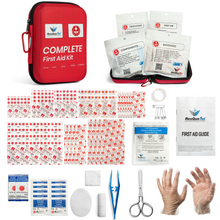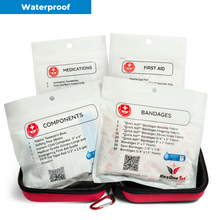
There are several things that no first aid kit is complete without. One of those categories is medications. Whether you're putting together a first aid kit for home, for work, or for travel, here's what you need to know about including medications.
Types of Medications You'll Find in a First Aid Kit:
Pain Relievers: This is the most common type of medication you'll find in a first aid kit. It's a must-have if you're stocking a kit on your own. There are several types of common pain relievers to choose from. Acetaminophen (or Tylenol) treats pain. Though it is generally safe for anyone to use, taking too much can be detrimental on the liver. Follow dosing instructions carefully. Ibuprofen is another excellent choice. It relieves pain, helps with fever, and reduces inflammation.
Allergy Medications: Hay fever or other mild allergic reactions are a very common problem. Keeping allergy medications in your first aid kit ensures you always have a solution. Diphenhydramine is an effective medication for combating allergic reactions. It tends to cause drowsiness as a side effect. This can be a good thing if taken before bed. If you'd prefer a non-drowsy allergy solution, stock your kit with Loratadine.
Stomach Medications: Stomach issues are another reason people reach for their first aid kit. There are a variety of medications to address digestive issues. Antacids are appropriate for treating mild heartburn. Loperamide or another anti-diarrheal is another essential, particularly if you're traveling. Bismuth subsalicylate, the active ingredient in Pepto Bismol, can help treat a variety of gastrointestinal issues.
Things to Remember When Stocking Your First Aid Kit with Medications
Keep Your Kit Up To Date: Medications can and do expire. If it's been a few years since you purchased or created your first aid kit, take a look at your expiration dates. Replace medications as necessary to ensure they work as intended when you need them.
Choose Medications Based on Your Needs: Not sure which medications to add to your kit? Think about the circumstances under which you're most likely to need them. For example, at home it may make sense to keep an extra bottle of your prescription medication in your kit. If you're stocking a kit for hiking, extra packets of pain relievers may be most useful. There's no one right answer, so choose what works best for you.
How Much Medication Should You Keep: Again, this is a question that varies from kit to kit. How much do you anticipate using your kit? If it's a "just in case" home kit, a few packets of various medications should suffice. A workplace kit is likely to be accessed more often, so it makes sense to keep more medication on hand. Keep an eye on what gets used most often. If you notice a certain medication running out more quickly than others, keep more of it on hand.









